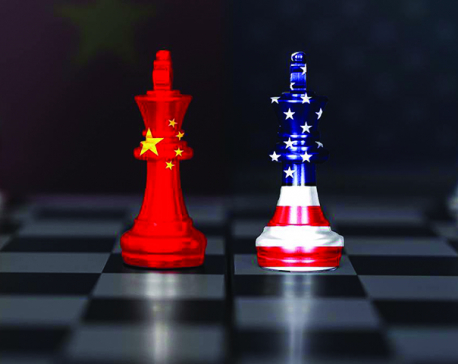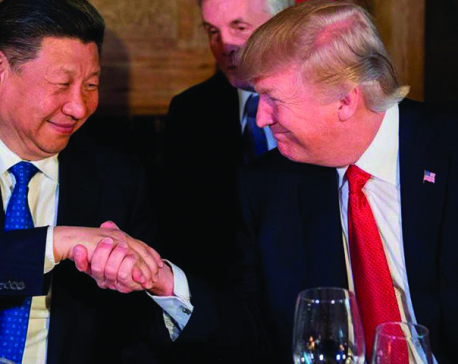
OR
As they clash to conquer
Published On: July 11, 2019 01:30 AM NPT By: Mahabir Paudyal | @mahabirpaudyal

Until Sino-US rivalry drags on, both China and America will try to have Nepal in their fold. How should Nepal respond?
These are rather unsettling times for those who follow geopolitics. Are the US and China talking? How long will the trade war last? What will happen to Nepal? Points of discussions among strategic thinkers revolve around these questions. Scholars have predicted the beginning of new Cold War.
China and America are clashing more than cooperating with each other. And this rivalry has started to spill out in public statements of Chinese and American envoys in Nepal as well.
So we have the American ambassador suggesting that we need to rely more on America. American officials visiting Nepal have been telling us, in a roundabout way, that we should be careful with China. Chinese mission in Kathmandu retaliates: It’s no business for America to tell Nepal and China what to do and what not to do. We are right next to Nepal. You need not preach.
The American mission insists they are more connected to Nepal. We are close where it counts, asserts the American envoy.
It may appear like both China and America are competing to endear us. But these superpowers are clashing and they want Nepal to remain on their side, it is another thing that they do not state it officially. And here is where the catch starts. Siding with Washington will rile up Beijing, siding with Beijing will naturally rile up Washington.
Geopolitical dilemma
Nepal is already the member of China-led Belt and Road Initiative (BRI). Agreements have been signed, at least some projects have been finalized and funding modalities are being discussed. For China, BRI is not just a connectivity project. It is a means for it to assert itself globally. For Nepal, BRI brings prospects of expanding its connectivity and diversification of trade and transit with China, which is why Nepali collective consciousness is largely welcoming of BRI. Perhaps because they don’t want to be seen as standing affront to China openly, Nepali political parties—irrespective of their ideologies and proximity with certain countries—have long taken the utility of BRI as a foregone conclusion. The only issue that remains to be settled is funding.
But this is particularly what seems to alarm the Americans. Earlier Indo-Pacific Strategy was hailed as a means to “ensuring security, good governance and economic success of Indo-Pacific region” that stretches “from the west coast of America to the west of India.” The idea, we were told, was to ensure “free and open Indo-Pacific in which all nations, large and small, are secure in their sovereignty and able to pursue economic growth consistent with accepted international rules, norms, and principles of fair competition,” as the Indo-Pacific Strategy Report published in June puts it. It was not spoken of in relation to BRI. But now the Americans themselves present it as the strategic tool to counter the rise of China.
American officials, those based in Kathmandu and others coming to visit Nepal, have started to say everything they offer—development aids, MCC grants of 500 million dollars and other cooperation measures—for Nepal will be the part of broader Indo-Pacific Strategy. They say Nepal has a “central role” in it. Perhaps to downplay this claim, Nepali officials and politicians—including Foreign Minister Pradeep Kumar Gyawali and Defense Minister Ishwar Pokhrel—have been denying Nepal becoming the part of any strategic alliance.
Most Nepali officials and commentators have been saying that Nepal should not push itself into BRI-Indo-Pacific confrontation. This wisdom seems to stem from the awareness of history.
Baggage of history
Nepal’s relation with China and America comes to be linked with Nepal’s sovereignty as well. Throughout much of Nepali history—China was a hedge for Nepal. Nepal thought of China as a power to lean on to keep East India Company from further encroaching on Nepali territory and politics.
Nepal’s opening up with America dates back to the days of Rana rule. But it was not easy for Nepal to maintain relations with America. Exchange of letters (contained in Matrika Prasad Koirala’s A Role in a Revolution) between Prime Minister Matrika Prasad Koirala and his Indian counterpart Jawahar Lal Nehru offers an insight. In the 1950s, Nehru was constantly advising Nepal not to diversify relation with the US. In one of the letters, Nehru expresses strong reservation with Koirala for engaging with America without taking approval from him (Nehru).
Perhaps for this baggage of history or for its geostrategic location, China and America enjoy good will in Nepal. China is seen as a benign, non-interfering neighbor. Nepalis are largely supportive of China. More Nepalis go to China than in the past. Now that China has emerged as the world’s second largest economy, there is awe and admiration for China than fear and anxiety.
America has its own place in Nepali imagination. Only those who lived through the 1970s may have had the grudge against the Americans for CIA operatives on Khampa rebellion. Otherwise, Nepalis, like the citizens of other developing countries do, see America as the land of opportunities.
Thus Nepal has the burden of being good to both. It cannot choose sides. The current government, despite failing on domestic front, has not bungled on its foreign policy conduct yet. Yet, we need to worry because the government that fails on domestic front is as much likely to fail on foreign policy front.
We need to worry because instead of appealing the two sides for peace and cooperation or stay neutral, some in Kathmandu have demonstrated the fondness of pitting China against America and vice-versa. America and China must be wise enough not to be carried away by such provocations.
Beyond the scene
For the moment, the meeting between President Trump and President XI at the G-20 Summit has lessened the prospect of trade war (by extension Cold War) from escalating further. But Sino-American rivalry has several aspects to it and it is unlikely to be resolved any time soon. For one, there is a great perception clash between the two superpowers. From the American perspective, it is China which is to be blamed. China, they claim, is rising by taking advantage of liberal world order led by America. China has made most out of its membership of World Trade Organization (WTO). Now that they have become rich, goes the American thinking, they are undermining the rules-based order.
The Chinese do not see it that way. We suffered the century of humiliation at the hands of the Western powers, goes the Chinese thinking, yet we worked hard despite all adversities for years and years. Now that we are becoming rich, why cannot we expand our influence across the world, just like America has been doing for long?
Chinese and Americans will continue to harbor such resentment against each other until they become friends and cooperate at higher level.
Since the World War II, American objective has been to change China to their liking. Richard Nixon used to say “The world cannot be safe until China changes. Thus our aim, to the extent that we can influence events, should be to induce change” in China.
Kurt M Campbell, who served as the US Assistant Secretary of State for East Asian and Pacific Affairs from 2009 to 2013 and Ely Ratner, who served as Deputy National Security Advisor to US Vice-President Joe Biden from 2015 to 2017, write in “The China Reckoning: How Beijing Defied American Expectations” in March/April 2018 issue of Foreign Affairs about how none of the US strategies—deepening commercial, diplomatic and cultural ties, the US power and hegemony, Beijing’s greater interaction with the international community—worked to change China. “Neither US power, nor regional balancing has stopped Beijing from seeking to displace the core components of U.S-led system.” “This is why,” they argue, this approach of dealing with China “should be done away with.”
In January/February 2019 essay of Foreign Affairs entitled “How China Hid its Global Ambitions,” Oriana Skylar Mastro, Assistant Professor of Security Studies at Georgetown University, states that China wants complete dominance in the Indo-Pacific region. China “wants to force the United States out and become the region’s unchallenged political, economic, and military hegemon. And globally, even though it is happy to leave the United States in the driver’s seat, it wants to be powerful enough to counter Washington when needed.” She argues that China is trying to “displace, rather than replace, the United States.” The ultimate goal, she contends, “is to push the United States out of the Indo-Pacific and rival it on the global stage.”
We don’t know where this rivalry will end and how. Until it continues, both China and America will try to have us in their fold. Our dealings with China will draw America’s attention and our dealing with America will attract Beijing’s notice. So how should Nepal respond?
Set the red line
The biggest affliction of Nepal’s foreign policy has been the tendency of individual leaders to conduct it the way they like. To stay in good book of global powers, they tend to violate basic foreign policy norms and ignore core national interests.
Chairman of Rastriya Prajatantra Party and former Foreign Minister, Kamal Thapa rightly loathed this tendency during the National Dialogue on Foreign Policy program hosted by Ministry of Foreign Affairs on June 28. Recalling the days of the 2015 blockade, Thapa spoke of how he would try to create favorable environment with New Delhi for normalizing the relation but how, back home, other leaders would spoil the environment by making conflicting statements.
This is the tendency Nepal must do away with especially when it comes to our relation with China, America and India. For that Nepal must draw the red line in foreign policy and political parties, media and civil society should stay within that red line. That red line can be, and should be, drawn through consensus among major actors. This is where program like National Dialogue on Foreign Policy can contribute.
Positively, none of the speakers in that program had differences over key foreign policy agendas. Foreign Ministry should bring all parties together on how to deal with China, America and India in these geopolitically sensitive times. In the process, Nepal will also be drawing its red line, the line that nobody will cross, no matter who leads the government.
mahabirpaudyal@gmail.com
You May Like This

Global consequences
The global consequences of a Sino-American cold war would be even more severe than those of the Cold War between... Read More...

False narrative on China
Fixation on China as an existential threat to American Dream has led to tit-for-tat tariffs, escalating security threats and warnings... Read More...

Face reality on China
America’s national interests would be far better served by facing reality and accommodating China’s rise ... Read More...







Just In
- NRB to provide collateral-free loans to foreign employment seekers
- NEB to publish Grade 12 results next week
- Body handover begins; Relatives remain dissatisfied with insurance, compensation amount
- NC defers its plan to join Koshi govt
- NRB to review microfinance loan interest rate
- 134 dead in floods and landslides since onset of monsoon this year
- Mahakali Irrigation Project sees only 22 percent physical progress in 18 years
- Singapore now holds world's most powerful passport; Nepal stays at 98th












Leave A Comment